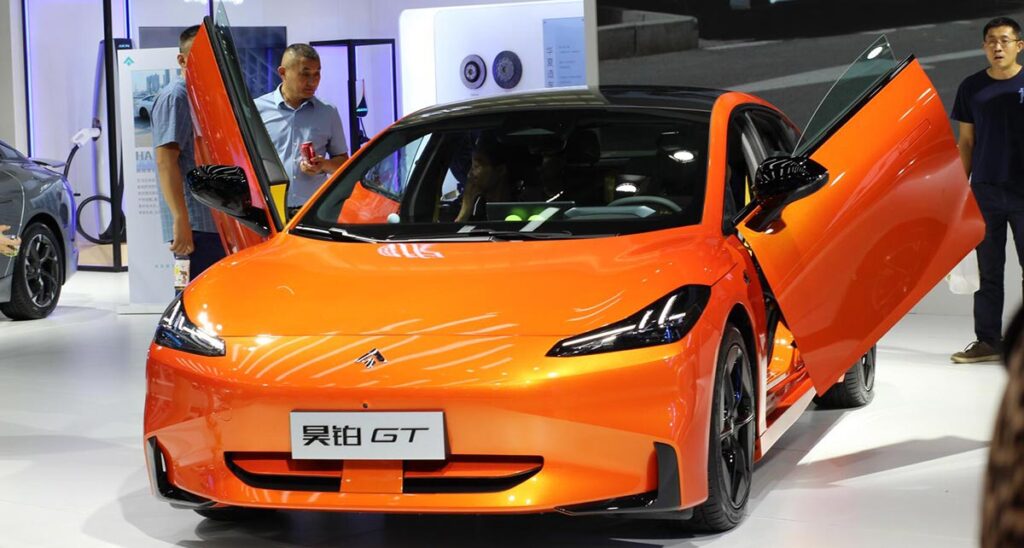Morgan Stanley cut its price targets on Nio and Xpeng, while raising its price target on Li Auto and maintaining its Overweight rating on them.

(Image credit: CnEVPost)
Morgan Stanley lowered its earnings estimates for the entire Chinese auto industry chain, saying that auto consumption will eventually change in tandem with economic growth, despite a strong performance in 2023.
Analyst Tim Hsiao’s team cut their earnings estimates for the Chinese auto chain by an average of 16.4 percent and 11.8 percent for 2024 and 2025, according to a January 7 research note sent to investors.
“Our updated forecasts suggest average earnings growth of 8.8% for OEMs excluding the EV trio, for which we see 78% revenue growth, in 2024,” the team wrote.
The EV trio refers to US-listed Nio (NYSE: NIO), Xpeng (NYSE: XPEV), and Li Auto (NASDAQ: LI).
The team’s average 2024 earnings forecasts for OEMs are 7.8 percent below market expectations, 5.7 percent for auto parts companies, and 26 percent for auto dealers.
Their forecast for China’s total passenger car sales in 2024 was maintained at 25.5 million units, representing a 2 percent year-on-year decrease.
Meanwhile, the team raised their forecast for China’s 2024 wholesale new energy vehicle (NEV) sales to 10.7 million units from 10.2 million units, representing a 21 percent year-on-year increase and a penetration rate of 42 percent.
China’s December wholesale sales of passenger NEVs are estimated at 1.13 million units, up 50 percent year-on-year and up 18 percent from November, according to data released on January 3 by the China Passenger Car Association (CPCA).
Preliminary estimates show that for the full year of 2023, China’s wholesale sales of passenger NEVs will be 8.88 million units, up 38 percent year-on-year, according to the CPCA.
On the retail side, the CPCA estimated China’s December passenger car retail sales to be around 2.27 million units, with passenger NEVs expected to be around 940,000 units. This means that full-year passenger car retail sales for 2023 are expected to reach 2.17 million units, implying a year-on-year growth of about 6 percent.
Final figures for December car or NEV sales in China are not yet available.
Hsiao’s team said China’s 2023 passenger car sales were stronger than their previous expectations, but that shouldn’t disrupt the cyclicality.
The team attributes the 2023 sales performance to several factors:
1) government support/subsidies to sustain consumption amid decelerating economic growth;
2) enriched product lineups with more aggressive NEV product rollouts;
3) pricing competition among OEMs (and partly passed on to upstream supply chains) to take market share; and
4) solid export progress with leading OEMs accelerating overseas expansion.
However, big-ticket consumption items such as automobiles are expected to follow some replacement cyclicity and fundamentally change in tandem with economic growth, the team said.
In addition, overseas initiatives may take some time to bear fruit as EU subsidy investigations and overseas plant capital expenditure cycles may cause problems for exports, according to the team.
The team expects intense price competition to persist in 2024, albeit intermittently.
Hsiao’s team said they focus on thematic opportunities such as the rising adoption of smart driving and emerging value content from new product launches by companies such as Li Auto, Xpeng, Nio and Hesai.
The team cut its price targets on a number of companies in the auto chain, lowering Xpeng to $23.1 from $25.4 and Nio to $13 from $18.7, but maintains an Overweight rating on both companies.
Meanwhile, Li Auto’s price target was raised to $63 from $53 previously and maintained an Overweight rating, one of the very few companies whose price target was raised by the team.
As of Friday’s US stock market close, Nio stood at $8.06, Xpeng at $13.09 and Li Auto at $34.16. Morgan Stanley’s latest price targets imply that the analysts see a 61.29 percent upside for Nio, 76.47 percent for Xpeng and 84.43 percent for Li Auto.

